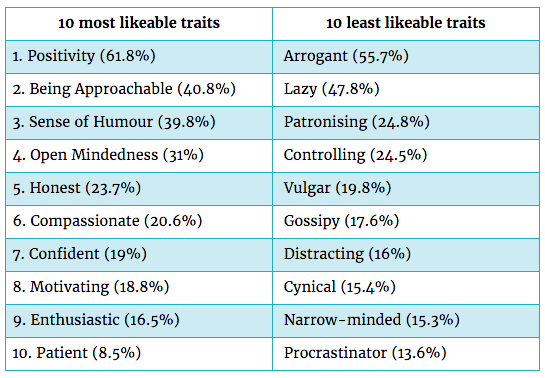What makes some people the gods of the water cooler and some the bane of office life? According to new research, the secrets of office popularity could have a direct impact on career growth.
Independent job site, CV-Library, surveyed 1,200 UK workers to learn more about the causal link, revealing that key traits that make people more likeable, like being positive, being approachable and having a sense of humour, correlates to getting ahead at work.
The research also revealed that two in three workers felt that people who aren’t liked struggle to move up the career ladder, associated with less desirable personality traits, like being arrogant, lazy and patronising.
A Columbia University study backs this up. Positive people get promoted quickly, receive better treatment in general, and are seen as being more trustworthy.

If you have ever wondered why some people just seem to float through life with the spotlight and vanity fan on them at all times, observe how they behave. These are the people who instinctively know the value of building relationships at work. They harness the power of networking to their benefit.
“It’s only natural to want to be liked, especially at work when you’re dealing with a variety of people. But, it’s important not to get too caught up with the office politics. Instead, try and figure out the right balance that will help you to move forward with your career and ultimately, be respected by colleagues and senior management alike,” advises Lee Biggins, founder and managing director of CV-Library.
Check your emotions if you want that promotion
Remaining true to yourself is key, especially as certain attributes will likely have landed you the job in the first place, says Biggins. “Listen carefully to feedback, be wary of coming across the wrong way and ultimately, don’t let your need to be ‘liked’ impact on your progression.”
The CV Library research also revealed that two in three UK workers feel that assertiveness is crucial to maintain respect among colleagues. Over half agreed that those who are too nice struggle with assertiveness in the workplace, suggesting that the perception of authority is almost synonymous with less emotional assertiveness.
While three in four respondents believe that it is acceptable to express emotions in the workplace, over half say it’s not okay to cry at work, with a further 86 per cent saying it is unacceptable to lose your temper.
Leave the sucking up at the door
Three in four surveyed employees think that being overly nice to your manager will not get you further ahead at work.
“Having some form of rapport with your manager is important as it enables you to be open and honest about your career goals, whether that’s in or outside the company you’re both working at. However, some workplaces will be stricter than others about this, so it very much depends on how much support you’d ideally like in your job,” Biggins continues.
“Ultimately, while the line between our personal and professional lives is becoming hazy, it’s best to keep it professional in the workplace and watch your actions: you never know when they might come back to haunt you!”
So what do career hot-shots do so differently?
1. They never forget a name
Great leaders place great value on truly connecting with other people. One of the simplest ways you can make someone feel special is to remember (and use) their name.
When you remember names and use it in conversation, it makes the person you’re speaking to pay greater attention. Studies show that hearing our name activates our brain, even when it’s spoken in a busy room.
Most of us have been there, awkwardly trying to ‘trick’ someone to repeat their name so we can make a proper introduction. So how do the uber successful remember so many names?
When they usually hear someone’s name, they make sure to plug it in during the conversation. For example, if you meet ‘Arnold’ at a networking event, say “hi, Arnold, nice to meet you,” or include his name (sparingly!) at the end of questions, like “how long have you been in finance, Arnold?”
It may also be helpful to ask for a business card, and to look at the person’s name in writing while you’re talking to them. This will establish a stronger link between the visual name and the person’s identity.
When saying goodbye, make sure to use the name while maintaining eye contact. They’ll feel appreciated, and you’ll commit the name to memory.
2. They talk less and listen more
There is nothing worse than someone going on and on about themselves. Go-getters are active listeners, who know that when networking, less is more. Highly likable people only speak when adding to the conversation, and know exactly when to ask follow-up questions.
3. They know how to work in body language
Research shows that the power of touch is invaluable when establishing relationships. Using casual, non-invasive or sexual physical cues as ‘punctuation’ during conversation can make the people you speak to feel accepted and liked, which boosts the way they see you. Highly likable people use it discreetly, and know when to hold back by reading the person they’re speaking to.
Similarly, closed off body language makes it hard for the people you speak with to get to know you. Standing with arms crossed, or hunching over when talking are visual cues that you’re unknowable or uninterested. Lean in when you’re in conversation, hold eye contact for at least 70 per cent of the time, and stand with shoulders back to make the most of body language.
4. They exude positivity
Likable people are mostly optimistic. They tend to focus on their successes rather than their failures, and rarely indulge in self-blame. Negative thoughts are like a snowball at the top of an icy mountain; one thought rolls into another, and before you know it, it’s an avalanche of negativity. Learn to steer self-doubt and negativity away, and keep the positive momentum going.
5. They are genuine
While these tips are a great starting point, laying it on too thick can be counterproductive. Highly likeable people aren’t fake. They exude sincerity because they genuinely care. The biggest takeaway lesson here is to actually care about the people you interact with.
These likeable people naturally relate to others’ problems and try to help in any way they can. They are tolerant of weaknesses, but know when to demand more from the people they work with.
6. They learn from failure, and move on
Likeable people know that failure is part of the journey. They are capable of learning from when things go wrong, and can move on with confidence because they know how to avoid it in the future. They know that in the blame game, everyone loses.
Where do you stand on the highly likable scale? Let us know in the comments.







